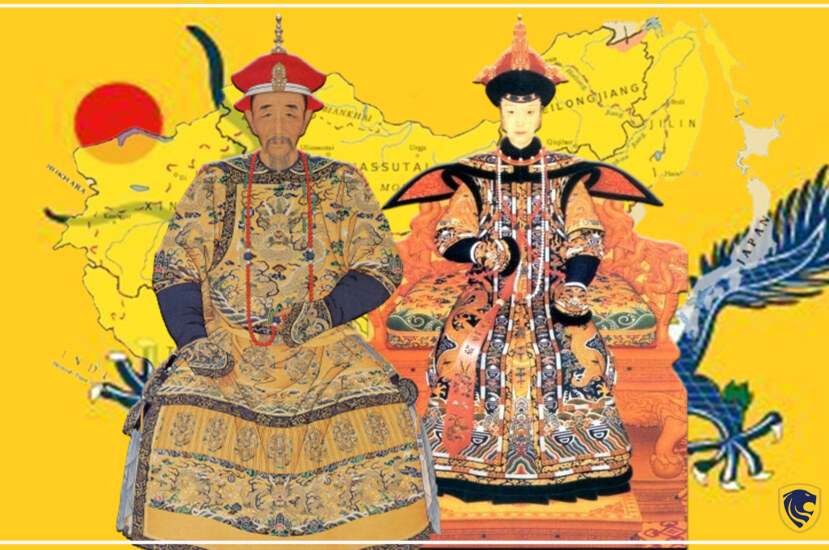Qing dynasty ruled the last empire of China. The end of Qing Dynasty in 1911 marked the end of imperial system in China, and it was the start of Republic of China.
Qing Dynasty
A semi-nomadic group of people who were from northeast of the Great wall, invaded ‘Ming state’ which was weak at the time due to internal conflicts. This semi nomadic group of people were referred to as ‘the Manchus’. They established Qing empire and ruled majority of Chinese population, ‘the Hans Chinese’. The Qing dynasty held dominion over China for nearly three centuries from 1644 to 1911.

The Qing emperors were conversant in Chinese as well as in Manchu. They spread Manchu customs among the Chinese Han people. For example, Han men were asked to cut hair in Mongolian fashion, otherwise they would be executed.
China under Qing Dynasty
In the eighteenth century, the Qing dynasty was at its pinnacle. Culture and art prospered in that period. Three Qing emperors namely, Kangxi, Yongzheng and Qianlong were credited with the honour for opulence and stability of the period. The emperor ‘Kangxi’ reigned from 1661 to 1722. ‘Yongzheng’s rule lasted from 1722 to 1735. And Qianlong ruled China from 1735 to 1796.
The Qing continued to hold exams to appoint civil servants and officials which used to be the practice before the start of Qing dynasty. The military was multi ethnic with Hans, Manchus and Mongols. The farming played a pivotal role as economic growth and prosperity were dependent on agriculture. It was not in major urban centers that the economy was centered on. Instead the economy was woven around farming villages and towns.

The leaders of Qing dynasty encouraged people to settle down in new lands and provided them with seeds and livestock. Also, they helped farmers with tax breaks. During this period, Ceramic industry bloomed. They made finest porcelains with a variety of choice for their use and export. When it comes to trade the Qing dynasty engaged in trade with the European countries but implemented restricted trade policies. In contrast, they maintained good rapport with Russian, Central Asian, and Southeast Asian neighbors and had informal, lenient trade agreements with them.
External Causes for Fall of Qing Dynasty
During the period of Qing dynasty, the European countries were in a mission to conquer the other countries and add up more territory to their empires. The Chinese Empire was not prepared enough to face Europeans’ imperialistic aspirations and undermined the threats from the external forces. The British were more powerful and barbarous than they thought of. Being in power for over a century by the mid 19th century, they thought they had unshakable power.
Opium Wars
The Chinese Empire imposed strict restrictions on trade with the intention of deviating from foreign influence. The British empire was at its peak under Queen Victoria. There was a huge demand for Chinese tea, but the Qing emperor demanded they pay in gold and silver for tea, and didn’t show any interest for trade negotiations.

So, Britain opted for trade of opium which was illicit, yet profitable. Qing officials took measures to burn 20 000 bales of opium. In retribution, Britain started “Opium Wars”. Two wars took place, in which the first war began in 1839 and came to an end in 1842. Also, the second war lasted from 1850 to 1860. In these wars Britain invaded mainland China causing lots of damage. The Britain was equipped with new technology.
Qing emperor lost both the wars. So, Chinese Empire had to agree with treaties that were partial. And Hong Kong came under British rule. Millions of pounds of silver were paid as compensation for destroyed opium. It was obvious to all, that Qing dynasty was not as powerful as before, but weak and vulnerable.
Loss of Power in regions on border

Chinese Empire lost power over its regions that were on border, gradually. Also, France grabbed power in Southeast Asia. The colony that French created was called ‘French Indochina’.
Sino-Japanese war

The Sino-Japanese war which happened from 1894 to 1895 showcased the weakness of Chinese Empire further. A conflict occurred between China and Japan over a dispute about Korea. Japan won the war and seized power in Taiwan and Korea. Korea was a Chinese tributary earlier. After this war Japan was recognized as a major world power.
Loss of Power in Coastal Areas
The balance of power that the royal court of Chinese empire exercised, was replaced by foreign powers. Those foreign powers include Britain, France, Germany, Russia, and Japan. They claimed the predominant control over China’s coastal areas by 1900. They remained a part of Chinese Empire, but trade and military were in control of foreign powers.

Internal Causes of Fall
There were internal forces that caused the downfall of Qing empire. The Qing dynasty came to power through the conquest of China. They didn’t attempt to integrate into Chinese culture and society, but always portrayed themselves as outsiders who conquered China.
White Lotus Uprising
A revolt against the Qing rulership took place in between 1794–1820 which was called ‘White Lotus uprising’.
That time period saw a growth in technology. With regard to agriculture, new irrigation techniques were brought into China from West and imported fertilizers were used extensively. In terms of medicine, new treatments for diseases such as smallpox, were introduced in China. As a result, Chinese population grew exponentially. 178 millions of population in 1749 increased to almost 359 million in 1811. By 1851, the population in China was nearly 432 million people.

In the early stages of empire, it wasn’t allowed to cultivate in northern regions. Those lands were exclusively allotted for Mongol pastoralists. It changed with the introduction of new corps such as potato and maze, hence cultivation was taken up in northern regions.
Initially, farmers in nearby regions of Mongolia worked for Mongols. Later masses from overpopulated Hubei and Hunun provinces arrived in the region. So, the number of migrants surpassed the number of indigenous people. Local people felt the need of their own leader. At one point this exploded into a rebellion. In 1794 the Chinese rose up against the rulership. Finally, the uprising was quelled by the Qing elites. But White Lotus organization persisted in secrecy.
The Boxer Rebellion

The populace disapproved the rule of Qing emperor. The image of Qing rulers as ‘Manchus of the north who conquered the country’, didn’t help to improve the loyalty of ordinary Han Chinese towards the Qing empire. Further, the ‘Mandate of heaven’ was an ancient Chinese concept. This mandate decides if the emperor is honourable enough to rule. If he doesn’t carry out his duties, he loses the mandate and he won’t be suitable to be the emperor. After the loss of ‘opium war’ the citizenry felt the Qing emperor had lost ‘the mandate of heaven’.
The Empress Dowager Cixi was the empress of China. In response to the opposition, she sacked people in the court who urged for modernization. She suppressed those who asked for reforms in a harsh manner.
In 1900 Chinese peasants rose against foreign involvement in the country. At first, they fought against both Qing emperor and foreign powers. Later the peasants joined Qing armies. But this revolt ended up in defeat. This heralded the end of Qing dynasty.
1911 Revolution

Populace in Southern China being unhappy about the Qing rule, began a revolution. In the face of the rebellion, the Qing empire prohibited the use of the word “rebellion. So, the word ‘rebellion’ was erased from world history textbooks.
“1911 revolution” turned out to be successful as Qing emperor was dethroned in October ,1911. Sun Yat Sen was the most prominent figure of the revolution as he played a major role in toppling the Qing dynasty. He was named the “Father of the Nation” in the Republic of China. The last emperor of Qing dynasty was emperor Puyi who was only six years old. His throne was formally renounced on 12th February,1912.
China was an imperial state for over two thousand years. China became a republic following the 1991 revolution. Sun Yat sen was appointed the first president of ‘Republic of China’.




